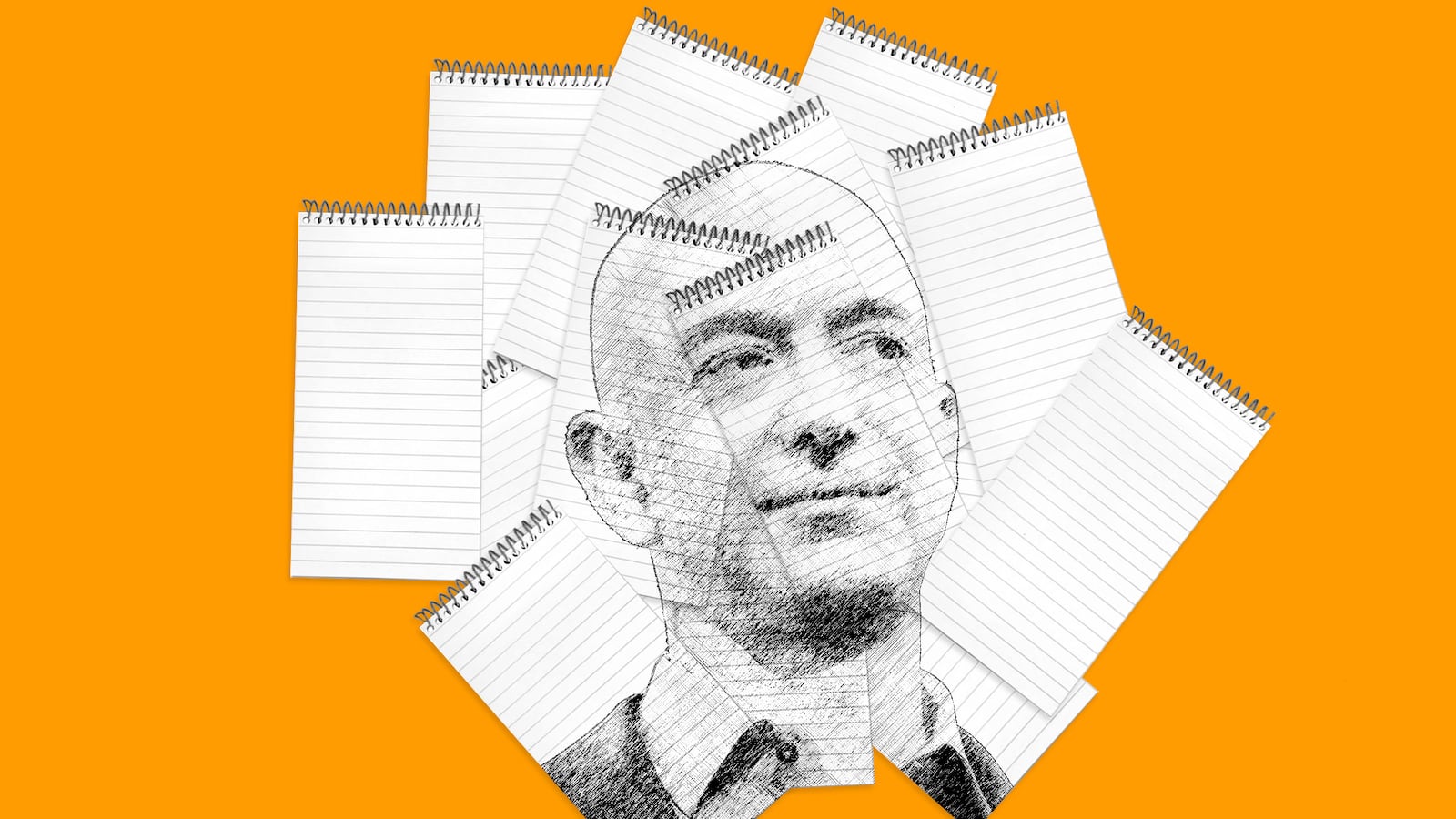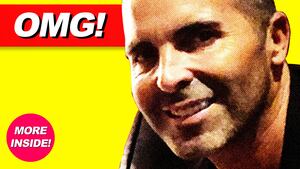As Jeff Bezos faces down the squalid celebrity tabloid machine of David Pecker, it gives him at least one thing in common with an earlier American plutocrat, John D. Rockefeller. He can complain about muckrakers.
But it depends what you mean by muckrakers. The term muckraker was coined by President Teddy Roosevelt to apply to reporters whose work annoyed him. For serious reporters it was a badge of honor for generations. There’s a whole American century of difference between the muckraker who brought down Rockefeller’s oil empire and the pursuit of Bezos’s genitalia by the National Enquirer. That kind of muckraking carries no honor.
Both Bezos with Amazon and Rockefeller with Standard Oil made their fortunes by grasping the same big idea: total control of a delivery system. Bezos realized that the internet could become the most efficient retail sales and delivery system the world had ever seen. Rockefeller realized that if he could build a cartel that fixed all the railroad charges for shipping oil in his favor he would fill the gas tanks of America just as the automobile was taking off.
Let’s be clear: there is a striking ethical gulf between these two innovations. Bezos didn’t need to create a secret cartel. His trick of was one of sheer nerve: to forgo profits for years until reaching a scale that brought market dominance.
Also Bezos is unlikely to reply, as Rockefeller did when asked why he had become the richest man in America, “I believe the power to make money is a gift from God. God gave me my money.”
Early in the twentieth century, the predations of plutocrats like Rockefeller and Andrew Carnegie provoked calls to break up excessive industrial power with anti-trust legislation.
Teddy Roosevelt’s problem with the muckrakers wasn’t with the idea of busting up trusts—he himself called them the work of “malefactors of great wealth.” He wanted to control the pace and degree of legislative action himself rather than have it forced on him by zealous investigative reporters.
One journalist in particular was running way ahead of Roosevelt in putting the heat on Rockefeller—Ida Tarbell, one of the most consequential forensic journalists in American history.
It isn’t just the power of Tarbell’s reporting that impresses—she more or less single-handedly forced the president and congress to pass historic anti-trust laws—it’s the vocational culture she faced as she worked, in a world of politics and journalism dominated by men.
Tarbell was hired by Sam McClure, the flamboyant editor and owner of McClure’s Magazine. McClure already had two accomplished investigative journalists on his staff, Ray Stannard Baker and Lincoln Steffens.
Steffens had made a career out of exposing big city corruption across the country. He had become a drinking buddy of Roosevelt when Roosevelt was governor of New York and enjoyed a back channel relationship with the president. Through Steffens, Roosevelt tried to slow down Tarbell’s probe of Standard Oil and when that didn’t work Tarbell was summoned for a one-on-one with the president—in which she prevailed.
“That’s the damndest woman I ever met,” Roosevelt complained to Steffens afterward, half in anger and half in admiration.
In 1911, after five years of a Justice Department investigation and many appeals, the Supreme Court delivered a verdict that led to the break-up of the Standard Oil monopoly. The court said, in a ruling that would shape all future anti-trust action, that Rockefeller’s cartel had been designed to “drive others from the field and exclude them from the right to trade.”
The Rockefeller case demonstrates a problem that persists to this day: when people get rich in ways that haven’t been seen before it takes a while to understand what’s happening and even longer to respond. There is also kind of symbiosis between how particular people get stinking rich and the state of American cultural development at the time.
That applies to all the newest generation of mega-plutocrats—to Bezos and the algorithm billionaires, Mark Zuckerberg and Sheryl Sandberg at Facebook, and Larry Page and Sergey Brin at Google.
The ad-supported search engine turned out to be what gasoline was for Rockefeller—a new way to riches of a scale and with an impact that even its creators didn’t truly grasp.
Zuckerberg offers a particularly dark study in the Frankenstein’s monster version of the innovator narrative whose work turns malign and spins out of his control. In attempting to defend Facebook’s witless role in allowing Russia to rig an American presidential election, both Zuckerberg and Sandberg revealed the fundamental corruption of their mindset: They see personal data as a de-personalized commodity to be sold, rather than what it really is, the intimate property of every individual that should be sovereign to them.
The Facebook and Google algorithms monetize personal habits, preferences, opinions and revealed behavior in a thousand different ways that is as macro as it is micro—macro in the sense that the whole process has become a new kind of alchemic capitalism, as well as a method of politically controlling and distorting information for a programmed outcome.
Clearly, legislators need to act to deal with these new plutocrats as they eventually did with Rockefeller.
But this is an American phenomenon that America is apparently less able (or willing) to police than other democracies. Google’s parent company Alphabet was forced to pay $5.1 billion in fines to European Union authorities in 2018—more than it paid in global corporate income taxes. And Facebook is arousing the wrath of British and European regulators with its arrogant disregard for the role it played by enabling the falsehoods of pro-Brexit propaganda and similar anti-immigrant propaganda peddled by autocrats in Hungary and Poland.
Given America’s raw-claw version of capitalism it’s as hard now as it was in the early twentieth century to get legislators to understand where unbridled plutocracy gets us. Congressional hearings on Facebook have exposed a woeful grasp among lawmakers of the tech industry and a guileless response to Silicon Valley’s empty apologies—for sure, some questions brought Zuckerberg to a state of petulant cold sweat but within months of that encounter Facebook’s profits hit record highs.
Bezos presents a different problem. In a capitalist society you can’t respond by legislating in favor of inefficiency in order to save a way of shopping that people no longer find convenient. That’s what the Soviet Union’s five-year plans tried. And political resistance movements like the one that sank Amazon’s planned New York development have no real permanent impact on its behavior.
The only way to save bricks and mortar stores is for them to find ways to deliver a standard of service at small scale that betters Amazon’s mega-scale—a renaissance in individual book stores is showing that that can happen.
And there is another intriguing twist in the face-off between Bezos and Pecker. On his own turf, Pecker is following the Bezos model by seizing control of the means of distribution.
He did this last year with two moves that were little noticed at the time. First he bought a package of 13 celebrity tabloid and teen titles with a combined readership of 38 million from the German-owned Bauer publishing group.
In effect, that gave Pecker’s company a monopoly of junk journalism on a scale never seen before, including, as well as the National Enquirer, US Weekly, In Touch, OK!, Star, Life & Style and Closer.
Following that, Pecker bought the The News Group, TNG, a magazine distributor that controls two-thirds of the wholesale magazine business in the U.S.. That was a particularly effective move, because it gives Pecker control of the most valuable real estate in impulse buying, supermarket checkout displays, where the most garish headline is reckoned to have five or six seconds to make a sale.
But none of this would have been possible without being bankrolled by a shadowy new player on the media scene, Chatham Asset Management, a hedge fund run by a secretive entrepreneur named Anthony Melchiorre. As part of this process the company that Pecker ran, American Media Inc, AMI, has lost its independence and disappeared into a new conglomerate named Worldwide Media Services Inc.
It’s unclear how well Pecker’s style in sleaze will fit into this new corporate behemoth. The reason he went after Bezos baffles some industry experts. Larry Hackett, who edited People magazine for eight years, wrote in the New Daily: “…my suspicions were triggered when I saw how much acreage the Enquirer devoted to its exclusive—the cover and 11 inside pages… I can assure you that a cover story on Mr. Bezos’s lovelife is newsstand poison.”
The suspicion is, of course, that this spread was aimed to please an audience of one, the president who tweeted: “So sorry to hear the news about Jeff Bozo being taken down by a competitor.”
In what demented universe is the Enquirer a competitor of the Washington Post? It’s not Bezos, the owner of the Post, who is the bozo here but the guy in the White House who hates the job the Post’s reporters are doing covering him.
This is, after all, the publisher who did the “catch and kill” deal with Michael Cohen to suppress tell-alls by Trump’s mistresses.
If Pecker’s new backers believe that his devotion to Trump is clouding the Enquirer’s editorial judgment and working against their commercial interests he could be for the chop.
Before Melchiorre came along AMI was, according to Bloomberg, in rocky financial shape, with years of losses leaving more than $1 billion in debt and negative net worth.
In the 1970s the National Enquirer was a more innocent joke on the fringe of the weekly tabloid game, using a formula of bizarre stories involving alien sightings, freak births and monstrous crimes. Celebrity chasing was then a minor part of the mix—and it all worked, producing a steady sale in the region of six million copies and fat profits. Editorial costs were low and the staff never took themselves seriously.
The circulation now is a fraction of that—the exact number is not clear but industry insiders put it below 300,000. That is partly a result of the forces driving the decline of all print media. The number of newsstands where the tabloids were once as strong sellers as candy bars has dwindled and—as the decision to buy a wholesaler shows—supermarket checkouts are a tough battlefield.
With a business as shaky as this it wasn’t such a smart idea to take on the world’s richest man and the legal resources he can deploy. It takes bottom-fishers like Pecker to give the term muckraker an ignoble meaning and it’s quite possible that it won’t survive him, a casualty of the debasement of so many of our values. One thing is for sure, Ida Tarbell is spinning in her grave at the idea of any association with Pecker.








